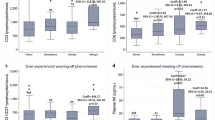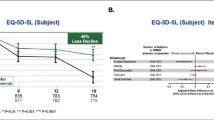Abstract
Background
The increase in life expectancy of patients with multiple sclerosis (MS) requires a better knowledge of disease features in the older patients group.
Objective
To describe the prevalence and profile of cognitive impairment (CI) in older patients with MS and perform a comparison with younger patients.
Methods
Patients were consecutively recruited for 6 months. Cognitive performance was assessed through the Brief Repeatable Battery and the Stroop Test. CI was defined as impairment in ≥ 2 cognitive domains.
Results
We identified 111 patients older than 55 years (mean age 59.7 years). The prevalence of CI was 77.4%, which was significantly higher than in younger patients (42.8%; p < 0.01). Information processing speed was the most impaired domain (68.8%), followed by verbal learning (49.5%), executive function (47.7%), and visuospatial learning (26.6%). We found no significant differences in the prevalence of impairment in the distinct cognitive domains between older and younger patients with CI. Depression and fatigue were not associated with increased CI among patients in the older age group (p > 0.70).
Conclusion
There is a remarkably high frequency of CI in older patients with MS. The similar profile of CI between older and younger patients suggests that CI is mostly directly related to MS itself and not to comorbid age-related disorders.

Similar content being viewed by others
Change history
12 November 2019
The above article was published online with an error in author name’s affiliation. The Author Claudia Niccolai has changed her affiliation to IRCCS Fondazione Don Carlo Gnocchi, Florence, Italy.
References
Marrie RA, Elliott L, Marriott J, Cossoy M, Blanchard J, Leung S, Yu N (2015) Effect of comorbidity on mortality in multiple sclerosis. Neurology 85(3):240–247. https://doi.org/10.1212/WNL.0000000000001718
Marrie RA, Yu N, Blanchard J, Leung S, Elliott L (2010) The rising prevalence and changing age distribution of multiple sclerosis in Manitoba. Neurology 74(6):465–471. https://doi.org/10.1212/WNL.0b013e3181cf6ec0
Chiaravalloti ND, DeLuca J (2008) Cognitive impairment in multiple sclerosis. Lancet Neurol 7(12):1139–1151. https://doi.org/10.1016/S1474-4422(08)70259-X
Amato MP, Zipoli V, Portaccio E (2006) Multiple sclerosis-related cognitive changes: a review of cross-sectional and longitudinal studies. J Neurol Sci 245(1–2):41–46. https://doi.org/10.1016/j.jns.2005.08.019
DeLuca J, Chelune GJ, Tulsky DS, Lengenfelder J, Chiaravalloti ND (2004) Is speed of processing or working memory the primary information processing deficit in multiple sclerosis? J Clin Exp Neuropsychol 26(4):550–562. https://doi.org/10.1080/13803390490496641
Klewer J, Pohlau D, Nippert I, Haas J, Kugler J (2001) Problems reported by elderly patients with multiple sclerosis. J Neurosci Nurs 33(3):167–171
Wood B, van der Mei IA, Ponsonby AL, Pittas F, Quinn S, Dwyer T, Lucas RM, Taylor BV (2013) Prevalence and concurrence of anxiety, depression and fatigue over time in multiple sclerosis. Mult Scler 19(2):217–224. https://doi.org/10.1177/1352458512450351
Nunnari D, De Cola MC, D'Aleo G, Rifici C, Russo M, Sessa E, Bramanti P, Marino S (2015) Impact of depression, fatigue, and global measure of cortical volume on cognitive impairment in multiple sclerosis. Biomed Res Int 2015:519785. https://doi.org/10.1155/2015/519785
Diamond BJ, Johnson SK, Kaufman M, Graves L (2008) Relationships between information processing, depression, fatigue and cognition in multiple sclerosis. Arch Clin Neuropsychol 23(2):189–199. https://doi.org/10.1016/j.acn.2007.10.002
Roy S, Frndak S, Drake AS, Irwin L, Zivadinov R, Weinstock-Guttman B, Benedict RH (2017) Differential effects of aging on motor and cognitive functioning in multiple sclerosis. Mult Scler 23(10):1385–1393. https://doi.org/10.1177/1352458516679036
Ruano L, Portaccio E, Goretti B, Niccolai C, Severo M, Patti F, Cilia S, Gallo P, Grossi P, Ghezzi A, Roscio M, Mattioli F, Stampatori C, Trojano M, Viterbo RG, Amato MP (2017) Age and disability drive cognitive impairment in multiple sclerosis across disease subtypes. Mult Scler 23(9):1258–1267. https://doi.org/10.1177/1352458516674367
Muller S, Saur R, Greve B, Melms A, Hautzinger M, Fallgatter AJ, Leyhe T (2013) Recognition performance differentiates between elderly patients in the long term course of secondary progressive multiple sclerosis and amnestic mild cognitive impairment. Mult Scler 19(6):799–805. https://doi.org/10.1177/1352458512461392
Roy S, Drake A, Snyder S, Cline B, Khan A, Fuchs T, Zivadinov R, Weinstock-Guttman B, Szigeti K, Benedict RHB (2018) Preliminary investigation of cognitive function in aged multiple sclerosis patients: challenges in detecting comorbid Alzheimer’s disease. Mult Scler Relat Disord 22:52–56. https://doi.org/10.1016/j.msard.2018.03.008
Bever CT Jr, Grattan L, Panitch HS, Johnson KP (1995) The brief repeatable battery of neuropsychological tests for multiple sclerosis: a preliminary serial study. Mult Scler 1(3):165–169
Stroop JR (1935) Studies of interference in serial verbal reactions. J Exp Psychol 18(6):643–662. https://doi.org/10.1037/h0054651
Amato MP, Portaccio E, Goretti B, Zipoli V, Ricchiuti L, De Caro MF, Patti F, Vecchio R, Sorbi S, Trojano M (2006) The Rao’s brief repeatable battery and Stroop test: normative values with age, education and gender corrections in an Italian population. Mult Scler 12(6):787–793
Krupp LB, LaRocca NG, Muir-Nash J, Steinberg AD (1989) The fatigue severity scale. Application to patients with multiple sclerosis and systemic lupus erythematosus. Arch Neurol 46(10):1121–1123
Montgomery SA, Asberg M (1979) A new depression scale designed to be sensitive to change. Br J Psychiatry 134(4):382–389
Prince M, Bryce R, Albanese E, Wimo A, Ribeiro W, Ferri CP (2013) The global prevalence of dementia: a systematic review and metaanalysis. Alzheimers Dement 9(1):63–75 e62. https://doi.org/10.1016/j.jalz.2012.11.007
Sachdev PS, Lipnicki DM, Kochan NA, Crawford JD, Thalamuthu A, Andrews G, Brayne C, Matthews FE, Stephan BC, Lipton RB, Katz MJ, Ritchie K, Carriere I, Ancelin ML, Lam LC, Wong CH, Fung AW, Guaita A, Vaccaro R, Davin A, Ganguli M, Dodge H, Hughes T, Anstey KJ, Cherbuin N, Butterworth P, Ng TP, Gao Q, Reppermund S, Brodaty H, Schupf N, Manly J, Stern Y, Lobo A, Lopez-Anton R, Santabarbara J, Cohort Studies of Memory in an International C (2015) The prevalence of mild cognitive impairment in diverse geographical and ethnocultural regions: the COSMIC collaboration. PLoS One 10(11):e0142388. https://doi.org/10.1371/journal.pone.0142388
Polliack ML, Barak Y, Achiron A (2001) Late-onset multiple sclerosis. J Am Geriatr Soc 49(2):168–171
Patti F, Nicoletti A, Messina S, Bruno E, Fermo SL, Quattrocchi G, Chisari CG, Maimone D, Cilia S, Zappia M (2015) Prevalence and incidence of cognitive impairment in multiple sclerosis: a population-based survey in Catania, Sicily. J Neurol 262(4):923–930. https://doi.org/10.1007/s00415-015-7661-3
Amato MP, Razzolini L, Goretti B, Stromillo ML, Rossi F, Giorgio A, Hakiki B, Giannini M, Pasto L, Portaccio E, De Stefano N (2013) Cognitive reserve and cortical atrophy in multiple sclerosis: a longitudinal study. Neurology 80(19):1728–1733. https://doi.org/10.1212/WNL.0b013e3182918c6f
Jonsson A, Andresen J, Storr L, Tscherning T, Soelberg Sorensen P, Ravnborg M (2006) Cognitive impairment in newly diagnosed multiple sclerosis patients: a 4-year follow-up study. J Neurol Sci 245(1–2):77–85. https://doi.org/10.1016/j.jns.2005.09.016
Gainotti G, Marra C, Villa G, Parlato V, Chiarotti F (1998) Sensitivity and specificity of some neuropsychological markers of Alzheimer dementia. Alzheimer Dis Assoc Disord 12(3):152–162
Roman GC (2002) Vascular dementia may be the most common form of dementia in the elderly. J Neurol Sci 203-204:7–10
Iadecola C (2013) The pathobiology of vascular dementia. Neuron 80(4):844–866. https://doi.org/10.1016/j.neuron.2013.10.008
Schmidt R, Enzinger C, Ropele S, Schmidt H, Fazekas F (2006) Subcortical vascular cognitive impairment: similarities and differences with multiple sclerosis. J Neurol Sci 245(1–2):3–7. https://doi.org/10.1016/j.jns.2005.06.018
Prins ND, van Dijk EJ, den Heijer T, Vermeer SE, Jolles J, Koudstaal PJ, Hofman A, Breteler MM (2005) Cerebral small-vessel disease and decline in information processing speed, executive function and memory. Brain 128 (Pt 9:2034–2041. https://doi.org/10.1093/brain/awh553
Marrie RA, Fisk J, Tremlett H, Wolfson C, Warren S, Blanchard J, Patten SB, Epidemiology CTit, Impact of Comorbidity on Multiple S (2016) Differing trends in the incidence of vascular comorbidity in MS and the general population. Neurol Clin Pract 6(2):120–128. https://doi.org/10.1212/CPJ.0000000000000230
Ruano L, Branco M, Portaccio E, Goretti B, Niccolai C, Patti F, Chisari C, Gallo P, Grossi P, Ghezzi A, Roscio M, Mattioli F, Stampatori C, Simone M, Viterbo RG, Amato MP (2018) Patients with paediatric-onset multiple sclerosis are at higher risk of cognitive impairment in adulthood: an Italian collaborative study. Mult Scler J 24(9):1234–1242. https://doi.org/10.1177/1352458517717341
Smestad C, Sandvik L, Landro NI, Celius EG (2010) Cognitive impairment after three decades of multiple sclerosis. Eur J Neurol 17(3):499–505. https://doi.org/10.1111/j.1468-1331.2009.02889.x
Amato MP, Langdon D, Montalban X, Benedict RH, DeLuca J, Krupp LB, Thompson AJ, Comi G (2013) Treatment of cognitive impairment in multiple sclerosis: position paper. J Neurol 260(6):1452–1468. https://doi.org/10.1007/s00415-012-6678-0
Riepl E, Pfeuffer S, Ruck T, Lohmann H, Wiendl H, Meuth SG, Johnen A (2017) Alemtuzumab improves cognitive processing speed in active multiple sclerosis-a longitudinal observational study. Front Neurol 8:730. https://doi.org/10.3389/fneur.2017.00730
Iaffaldano P, Viterbo RG, Paolicelli D, Lucchese G, Portaccio E, Goretti B, Direnzo V, D'Onghia M, Zoccolella S, Amato MP, Trojano M (2012) Impact of natalizumab on cognitive performances and fatigue in relapsing multiple sclerosis: a prospective, open-label, two years observational study. PLoS One 7(4):e35843. https://doi.org/10.1371/journal.pone.0035843
Funding
This research received no specific grant from any funding agency in the public, commercial, or not-for-profit sectors.
Author information
Authors and Affiliations
Corresponding author
Ethics declarations
All the enrolled patients provided informed consent and the study was approved by the ethical committees of all recruiting institutions.
All procedures performed in studies involving human participants were in accordance with the ethical standards of the institutional and/or national research committee and with the 1964 Helsinki declaration and its later amendments or comparable ethical standards.
Conflict of interest
The authors declare that there is no conflict of interest.
Additional information
Publisher’s note
Springer Nature remains neutral with regard to jurisdictional claims in published maps and institutional affiliations.
Rights and permissions
About this article
Cite this article
Branco, M., Ruano, L., Portaccio, E. et al. Aging with multiple sclerosis: prevalence and profile of cognitive impairment. Neurol Sci 40, 1651–1657 (2019). https://doi.org/10.1007/s10072-019-03875-7
Received:
Accepted:
Published:
Issue Date:
DOI: https://doi.org/10.1007/s10072-019-03875-7




